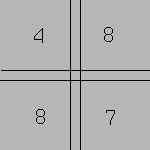Как из "$@" получить массив или список аргументов, содержащий список всех аргументов, кроме последнего?
Т.е. из 1 2 3 4 получить 1 2 3
Ответ на:
(info "(bash) Shell Parameter Expansion")
от Zmicier


Ответ на:
комментарий
от d_a

Ответ на:
комментарий
от d_a
Ответ на:
комментарий
от shdown
Ответ на:
комментарий
от teod0r
Ответ на:
комментарий
от i-rinat
Ответ на:
комментарий
от teod0r
Ответ на:
комментарий
от teod0r
Ответ на:
комментарий
от Zmicier

Ответ на:
комментарий
от anonymous
Ответ на:
комментарий
от teod0r


Ответ на:
комментарий
от Zmicier
Ответ на:
комментарий
от anonymous
Ответ на:
комментарий
от d_a
Ответ на:
комментарий
от anonymous

Ответ на:
комментарий
от teod0r
Ответ на:
комментарий
от teod0r
Ответ на:
комментарий
от Zmicier

Ответ на:
комментарий
от teod0r
Ответ на:
комментарий
от Zmicier

Ответ на:
комментарий
от teod0r
Вы не можете добавлять комментарии в эту тему. Тема перемещена в архив.
Похожие темы
- Форум Zenity, массив и экранирование (2013)
- Форум Отличия понятий «список» и «массив»? (2018)
- Форум [C++] Массив разных классов и массив ссылок на разные классы (2010)
- Форум Javascript вытащить свойста объекта (со вложенными объектами) в массив (2016)
- Форум [вещества] энергия-масса (2011)
- Форум распределённый массив (2010)
- Форум gcc + массив строк... (2004)
- Форум Масса гравитационного поля (2009)
- Форум масса Земли (2012)
- Форум Массив строк (2001)
